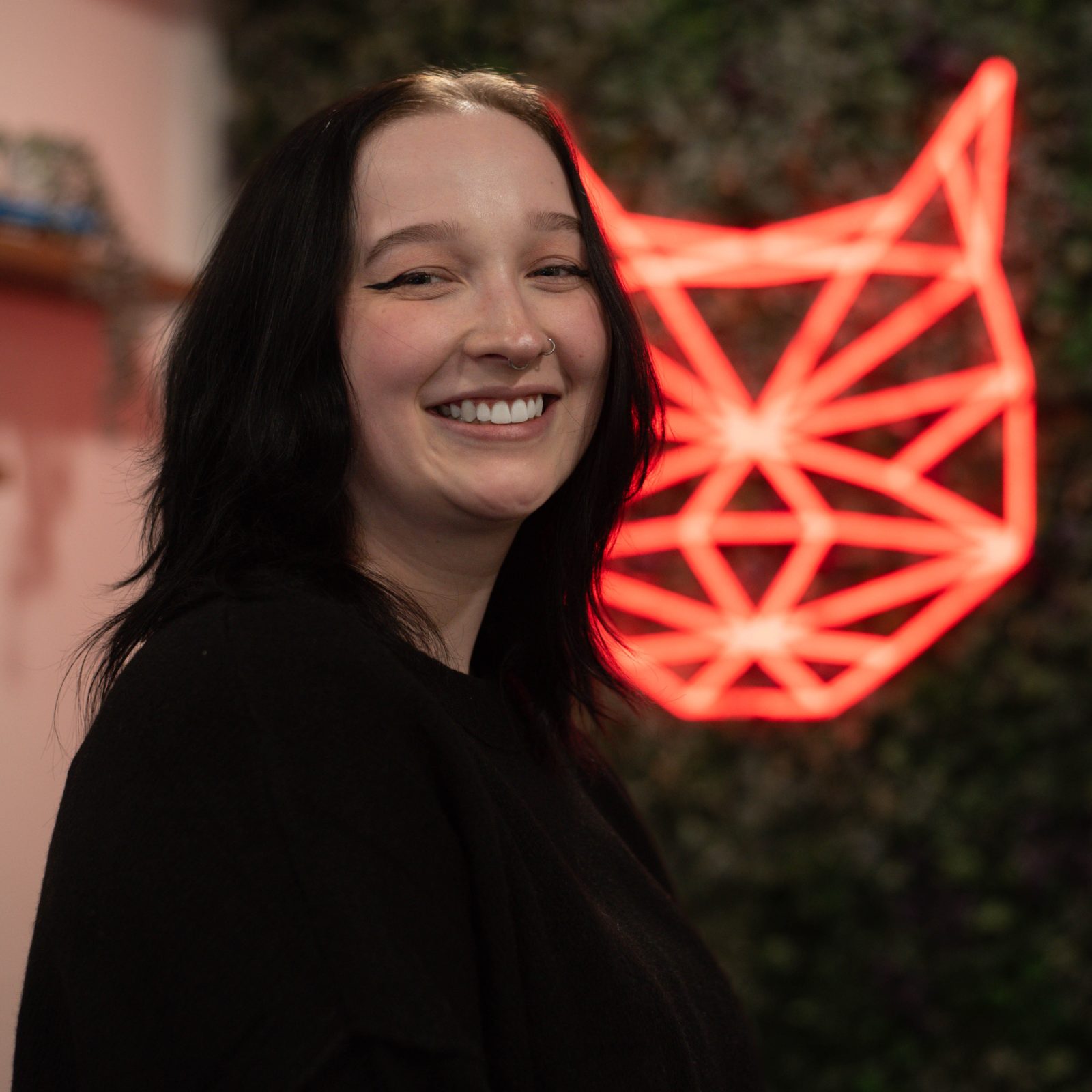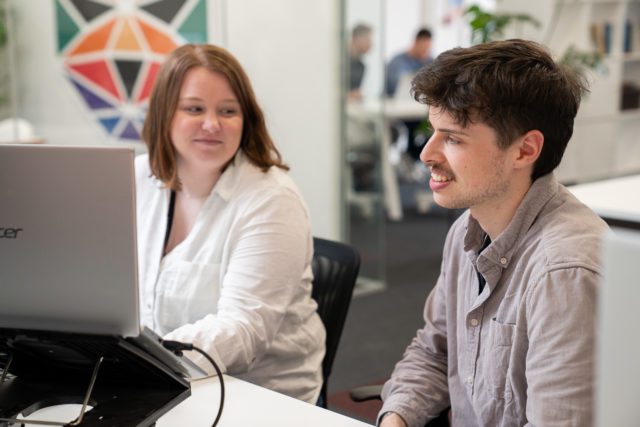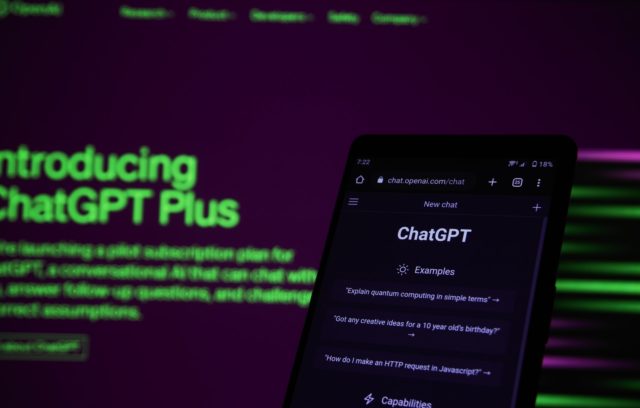Creating effective website content relies on choosing the right keywords and understanding how Google interprets them. Even with a strong SEO strategy, websites can unintentionally compete with themselves. This issue is known as keyword cannibalisation, and it can limit the visibility and performance of your pages.
This guide explains what keyword cannibalisation is, why it happens, how to detect it, and the steps you can take to fix and prevent it. You will also find up-to-date methods using Search Console, auditing tools, clustering tools and intent analysis, along with guidance on how to future-proof your content for AI-driven search changes.
Jump To:

Keyword cannibalisation is when multiple pages on a website target the same keyword or the same search intent, leading those pages to compete with each other in search results.
This overlap can dilute your authority, split ranking signals and reduce the visibility of pages that should perform well. It can also weaken link equity, as backlinks become spread across several URLs instead of strengthening a single primary page.
Keyword cannibalisation is not always caused by using the same keyword on more than one page. You can target the same keyword across different pages when each one has a clear and distinct purpose. Problems appear only when pages cover the same topic in a similar way or meet the same search intent.
A well-structured SEO strategy assigns each page a unique role and ensures that its purpose is clear during crawling and indexing. This clarity helps Google understand how the content should rank and reduces the risk of internal competition.
Find out more about developing a successful keyword strategy by reading our detailed blog on Keyword Best Practices.
Keyword cannibalisation occurs when Google crawls and indexes multiple pages on the same website targeting the same search intent. When several pages appear to serve the same purpose, Google may struggle to understand which one should rank, resulting in those pages competing against one another.
This typically happens when websites unintentionally create overlapping content, such as:
Using the same keyword across multiple pages is not a problem on its own. Issues arise only when the pages have similar intent or answer the same need. If each page has a clear purpose, Google can distinguish between them during crawling and indexing and rank them accordingly.

Detecting keyword cannibalisation involves understanding how Google currently views your pages and whether more than one URL appears to have the same purpose. The steps below guide you through a practical process that combines manual checks with data from key SEO tools.
A site search provides a quick way to see all pages on your domain that Google associates with a particular keyword.
Follow these steps to check for potential overlaps:
What indicates cannibalisation?
If several pages feel similar in purpose, they may be competing for the same query.
Jump to: Content That Covers The Same Topic
Google Search Console (GSC) shows how Google actually ranks your content, making it the most direct way to detect cannibalisation.
Follow these steps when using Google Search Console:
What indicates cannibalisation?
If two or more pages appear under one query, Google has not identified a single page that clearly satisfies the search intent.
Screaming Frog allows you to identify structural and content similarities that may indicate cannibalisation.
Follow these checks in Screaming Frog:
What indicates cannibalisation?
If several pages contain similar content, metadata or themes, Google may struggle to distinguish between them.
Ahrefs can highlight when Google ranks multiple URLs from your site for the same or similar keywords.
Follow these steps in Ahrefs:
What indicates cannibalisation?
If more than one page appears for the same keyword or group of keywords, it suggests these pages are overlapping in focus.
Clustering tools such as Keyword Insights group keywords by search intent, based on SERP similarity.
Follow these steps when using a clustering tool:
What indicates cannibalisation?
If your pages are grouped into the same intent cluster, Google sees them as serving the same purpose.
If you’ve identified pages that might be competing, the next step is understanding whether their intent overlaps. The following section explains how to assess this.
As a rule of thumb, branded keywords are less of a concern when it comes to keyword cannibalisation. It is common to achieve multiple high rankings for the same branded keyword, meaning that as long as you are serving the user’s search intent, you can use the same brand keyword on multiple pages.

Once you’ve identified pages with similar or overlapping content, the next step is to review what each page is actually trying to achieve. Two pages might use the same keyword, but if the intent and purpose of the content are clearly different, they are unlikely to compete. However, when two pages cover the same topic in the same way, or aim to answer the same user need, cannibalisation becomes much more likely.
Search intent describes the goal behind a user’s query. It helps Google decide which page is the most suitable result. Pages generally fall into one of four intent types:
Intent is a key factor when assessing whether two pages genuinely overlap. If the intent is different, the pages can usually coexist. If the intent is the same, they may compete for visibility.
For example, two pages targeting “marathon training” may serve completely different purposes. One might be a commercial page promoting training plans, while the other is an informational blog offering tips for beginners. Because they satisfy different intents, these pages do not necessarily conflict.
Cannibalisation becomes a risk when intent starts to blur. If an informational blog is updated with strong commercial messaging, it may begin to compete with an existing landing page designed specifically for conversions. Likewise, a product or service page that includes extensive informational content may attract queries meant for a blog article.
Some overlap is natural and even beneficial. For example, commercial content can lead smoothly into transactional intent when the user is ready to act. However, other combinations can cause issues if not handled carefully. Examples include:
| Overlap | Description of content intent | Why it can be harmful |
|---|---|---|
| Informational & Transactional | This content offers the user the information they are looking for while also trying to convince them to take an action on the same page. | Typically, someone searching for information is in the research phase of the buying journey. Mixing the two can make them feel pressured. |
| Navigational & Commercial | This content is meant for a specific site section, such as “login”, while also commercialising what’s on the page. | If someone has typed “login”, they want to be taken directly to that action, not shown pricing or package explanations. |
| Informational & Navigational | This content provides users with a comprehensive answer while expecting them to use it as a navigational step. | Users in the navigational phase already know what they want. They don’t want to read extensive information to reach their destination. |
If you find that you have a page or blog that mixes two search intents, it’s important that you analyse the content to decide whether or not changes are needed. For example, sometimes mixing informational and commercial intent can be acceptable, as people who want to research a product or service before purchase may also find extra informative information useful.
However, if you have a separate page dedicated to commercial intent on the same topic, you should either blend the two pages together, link them internally, or rewrite them to have separate search intents.
Jump to: How To Fix Keyword Cannibalisation
If you find that two pages mix intent in a way that creates confusion, you may need to rearrange or rewrite the content so each page speaks clearly to a different stage of the journey. Sometimes this means separating the educational content from the commercial content; in other cases it may be better to consolidate pages or link them together more effectively.
The best approach is to ensure each page has one clear purpose. When intent is defined and consistent, Google can understand how the content fits together and is far less likely to confuse one page for another.
Best practice is to have dedicated pages for the different search intents.

Once you have identified pages with overlapping content or intent, the next step is to decide which page should take priority. Not every competing page needs to be removed, but you do need to determine which one is the strongest candidate to lead on the topic. This prevents search engines from splitting relevance between multiple URLs and helps consolidate your authority into one clear resource.
There are several factors that can help you decide which page should be the primary version. These reflect the signals that Google uses to understand quality, relevance and purpose.
Begin by comparing how each page performs in organic search. A page that attracts steady, relevant traffic or maintains stable rankings is usually the stronger candidate to keep. If another page receives very little visibility or fluctuates heavily, it may be better suited for consolidation or redirection.
Backlinks are still an important measure of trust. If one page has earned links from reputable websites, it will usually be the better page to keep. Redirecting or merging weaker pages into the stronger URL helps preserve this authority.
For commercial and transactional pages, conversions can be a decisive factor. If one page consistently drives enquiries, sales or sign-ups, it should take priority over a page that does not convert. Even for informational pages, metrics such as time on page, scroll depth or internal link clicks can help you understand which version users find more helpful.
If both pages perform similarly, consider which one is more up to date. Content that reflects current information, examples or best practices often performs better. If an older page still ranks but is outdated, merging its useful sections into the fresher version can strengthen the main resource. When checking your content, it’s important to take into consideration evergreen content and how removing it could affect your rankings.
Once you understand which page should take the lead, you can choose the most effective fix.
Jump to: How to fix keyword cannibalisation

Content overlap is a common cause of keyword cannibalisation, but technical issues within a website can also create situations where several URLs compete for the same keywords. These issues often arise when search engines interpret multiple versions of a page as unique content. Understanding how this happens can help you identify where technical adjustments may be needed.
URL parameters are added to the end of a URL to filter, sort or track content. They usually appear after a question mark and are common on ecommerce and news websites. Although these variations do not change the main content, search engines treat each parameter as a separate page.
Example
A user might generate the following URLs while browsing:
/products?category=womensclothes
/products?category=womensclothes&size=10
Both show the same products, but search engines see two different URLs and may index both. This can lead to several pages competing for the same keywords.
URL parameters are also used for pagination, campaign tracking or session IDs, all of which can unintentionally create duplicate or near-duplicate pages if not handled correctly.
Jump to: How to fix keyword cannibalisation
Pagination divides content into multiple URLs, often through numbered pages. This is common for long articles, product listings or archives. While this helps users navigate large amounts of content, search engines still treat each paginated URL as its own page.
Example
A category page might appear as:
/news
/news?page=2
If both pages repeat similar headings or keywords, search engines may view them as competing resources. As a result, Google may not be able to determine which page is the most relevant, which can weaken overall visibility.
Jump to: How to fix keyword cannibalisation
Faceted navigation allows users to refine results using selectors such as brand, colour, size or price. Each filter applied generates a new URL, which can quickly lead to hundreds of parameter variations. While these pages feel helpful to users, they often present the same core results and can overwhelm search engines with duplicate or near-duplicate URLs.
Example
Filtering by brand and colour might generate:
/jackets?brand=acme&colour=blue
Changing the order of the filters might generate:
/jackets?colour=blue&brand=acme
Even though both URLs show the same jackets, search engines treat them separately and may index both. If this continues, it becomes difficult for Google to understand which pages should rank for key terms like “blue jackets” or “waterproof jackets”.

Jump to: How to fix keyword cannibalisation
Internal linking gives search engines signals about which pages are most important and how topics are organised across your website. When internal linking is unclear or inconsistent, search engines may misinterpret the relationships between pages.
Using generic anchor text such as “click here” or “read more” gives search engines very little information about the content of the page being linked to. This can make it harder for Google to understand which pages should rank for certain keywords.
If you use the same anchor text for different destination pages, search engines cannot easily determine which page is the most relevant for that term.
Example
If several articles use “dog treats” as anchor text but each link points to a different page, Google receives conflicting signals about which URL should rank for “dog treats”.
Link equity reflects the authority that a page gains through internal and external links. If several competing pages link to each other or receive similar internal links, authority becomes diluted across multiple URLs rather than flowing to the page you want to rank. This can reduce the overall strength of your primary page and increase the likelihood of cannibalisation.
Technical causes like URL parameters, pagination, faceted navigation and unclear internal linking can create multiple URLs that appear to serve the same purpose. When Google indexes these variations, the pages may begin to compete with one another, even if that was not your intention. Reviewing and addressing these issues helps search engines understand which page should take priority and improves your overall ranking potential.

Once you have identified pages that compete with each other, the next step is to resolve the overlap so that search engines can clearly understand which page should rank. There are several reliable methods for fixing cannibalisation, and the right approach depends on how similar the pages are, how they perform and what purpose they serve within your site.
If two pages cover the same topic and provide similar information, combining them into one stronger, more comprehensive resource is often the best solution. This helps consolidate ranking signals, reduces duplication and gives users a single clear page that answers their query.
If one page clearly performs better or offers more value than the other, consider redirecting the weaker page to the stronger one. A redirect passes authority to the chosen URL and prevents users and search engines from accessing duplicate or outdated content.
If two pages have the potential to coexist but currently compete due to overlapping messaging, you can rewrite one of them to target a different intent or focus. For example, an informational article may be adjusted to answer early-stage questions, while a competing page may be refined to serve commercial intent.
Internal links help search engines recognise which page is most important for a specific topic. Ensure your main page receives consistent, descriptive links from other relevant pages on your site. This strengthens its authority and reduces the chances of another page competing unintentionally.
A canonical tag tells search engines which version of a page should be treated as the primary one. This is especially useful when technical factors create duplicate URLs, such as pages with tracking parameters or filtered views. Setting a canonical version helps prevent search engines from indexing unnecessary duplicates.
In some cases, a page may not need to appear in search results at all. Applying a noindex tag prevents search engines from ranking that page. This option is suitable for content that serves a purpose for users but does not need organic visibility, such as thin tag pages or duplicate filtered views.
Preventing cannibalisation begins with a clear strategy for content planning, keyword targeting and internal linking. By taking steps to guide both users and search engines through your content, you can minimise overlap and maintain a strong, organised structure.
A keyword map assigns one primary keyword and purpose to each URL on your site. This helps prevent new content from targeting terms already covered elsewhere. Maintaining this document regularly ensures that your content strategy stays aligned as the site grows.
Before publishing new content, define what the page is meant to achieve and where it fits into the user journey. Pages with clearly distinct intent are far less likely to compete with each other.
A quick review of existing pages can prevent accidental duplication. Look for pages that cover the same topic, answer the same question or target the same type of search intent. If overlap exists, consider updating an existing page instead of creating a new one.
Avoid combining multiple intents within the same page, such as mixing educational content with persuasive sales content. Keeping each page focused on one role helps search engines interpret its purpose correctly and reduces the risk of conflicting signals.
Internal linking should reinforce your content structure. Use descriptive anchor text and link consistently to your main pages. This makes it easier for search engines to understand which page is most authoritative for each topic.
Over time, websites naturally accumulate outdated or overlapping content. Periodic audits help you identify opportunities to update, consolidate or reposition pages. This is especially important for websites that publish content frequently.

If you need support identifying, resolving or preventing keyword cannibalisation across your website, our team can help. We carry out detailed content audits, fix competing pages and build clear keyword strategies that strengthen your organic performance. Get in touch with Wildcat Digital to improve your site structure and protect your rankings.

Founder
Our founder, Will Hitchmough, worked at a number of high profile Sheffield Digital Agencies before founding Wildcat Digital in 2018. He brings an extensive knowledge of all things related to SEO, PPC and Paid Social, as well as an expert knowledge of digital strategy.
Digital Marketing can be a minefield for many businesses, with many agencies ready to take your money without knowing how to deliver results. I founded Wildcat Digital to deliver digital success to businesses with smaller budgets in a transparent way.

Head of Growth
Rich joined us in May 2024 to head up our growth team. With years of experience helping other agencies to grow, Rich joins us at an exciting time as Wildcat is working on a five-year plan to become one of the biggest agencies in the UK.
Outside of work, Rich is a father to three children, which keeps him very busy! He’s also recently started running again to keep fit and loves a bit of DIY.

Head of Digital
Sarah joined Wildcat in January 2025, bringing over seven years of SEO expertise to the team. With a background in Fashion Communication and Promotion, she has worked both in-house and at agencies, covering a range of digital marketing specialisms before focusing on SEO.
Passionate about all things search, Sarah thrives on helping brands grow their online presence.
Outside of work, she enjoys walking her dog, running, and shopping for vintage clothing.

Office Manager
Amelia joined Wildcat Digital in January 2025, bringing extensive experience in HR, Health & Safety, Facilities Management and IT Support. Previously an Operations Manager at The University of Sheffield, she has a strong background in creating efficient and well-organized work environments.
Specialising in HR, Health & Safety, and Facilities Management, Amelia ensures the Wildcat Digital team has the resources and support needed to thrive. Whether managing office operations, maintaining compliance, or fostering a positive workplace culture, she keeps everything running smoothly.
Outside of work, Amelia loves trying new things, traveling, camping, and walking. She also enjoys socialising and exploring new places with friends and family. Her adventurous spirit and proactive approach make her a valued member of the team.

Client Success Coordinator
Siena joined us in 2023 with a background in sales and digital marketing. She leads on client relationships across the company, ensuring that our customers are happy throughout their journey with us, from their initial consultation through to onboarding and beyond.
Outside of work, Siena enjoys travelling and getting stuck into the local culture. She likes to make the most of her experiences and particularly enjoys watching sunrises and sunsets from beautiful locations around the world.

SEO Account Director
Paul has a strong background in SEO, having previously founded and ran a successful eCommerce business, as well as running a personal blog that achieves an average of 17K users per month. Paul’s knowledge of SEO is extensive, with a strong emphasis on client handling and technical SEO.
Outside of work, Paul enjoys spending time with his family and staying active with weight lifting and combat sports.

Team Lead & Technical SEO Account Manager
With a degree in Computer Science and SEO experience dating back to 2017, Dariusz has a wide range of SEO skills and knowledge. His specialist knowledge of Technical SEO has firmly landed him the title of Wildcat’s Technical Wizard, and he has recently taken on the responsibility of Team Leader for the Panthers Team.
In his spare time, Dariusz loves hiking, experimenting and trying new coffees and loves learning new things. He is currently learning more about CRO and AI and how this could benefit our clients.

Team Lead & Senior SEO Account Manager
With a background in sales, Molly is a natural Account Manager, brilliantly handling any issues that come her way. Having joined us as a Digital Marketing Executive, and working part-time through her final year of University, Molly is a shining example of how hard work pays off. She is now an SEO Account Manager with a particular interest in Content and Client Management.
In her spare time, Molly loves to get out in nature, hiking and exploring the Peak District. She also loves cooking and likes to unwind with a bit of yoga.

PPC Team Leader
Libby joined Wildcat in 2021 as our first PPC hire. With a degree in Digital Media Production, a Master’s in Digital Media Management and previous experience in Social Media Management, Libby hit the ground running and has since climbed the ranks to Senior PPC Account Manager and has a particular interest in the eCommerce sector.
Outside of work, Libby likes gaming, and cooking and likes to keep active by lifting weights.

Senior SEO Account Manager
With a degree in Film and TV production, and a varied career history, Jamie made the move to marketing with a Masters degree in Digital Media Management. He has since worked in SEO at Agencies across Sheffield, before joining Wildcat and working his way up to SEO Account Manager. Jamie has a particular interest in backlinks and Digital PR and has recently gained a client a valuable backlink from Forbes!
In his spare time, Jamie is an avid foodie and loves trying new restaurants and cuisines. He also loves to travel and spent a year travelling to Australia after university.

SEO Account Manager
Jasmine joined Wildcat in 2022 with a strong background in SEO and Account Management. At the time, she was finishing up a Level 4 Apprenticeship in Digital Marketing from the Chartered Institute of Marketing, and has since worked her way up to SEO Account Manager. Jasmine excels at content writing and promotion, and particularly enjoys finding creative ways to join the dots on multi-channel campaigns.
In her spare time, Jasmine volunteers at a charity, helping combat loneliness & social isolation experienced by older neighbours. Outside of Wildcat, she owns a catering company, Savery Grazing, creating delicious grazing tables & platters for a range of events. She also loves skiing and exploring the Peak District.

Senior SEO Executive
After spending ten years managing businesses, restaurants, cafes and event spaces across Sheffield, Jon decided to change careers and joined Wildcat as an SEO Executive in 2022. He especially enjoys the client management side of the job, helping them to understand digital marketing and ways in which they can build their business’s presence online.
Outside of work, Jon likes to keep fit with running, badminton and football, and also loves music.

Senior SEO Executive
Andy joined Wildcat in 2023 after starting his digital marketing career in-house for a local Sheffield company. Since joining, he has developed a strong interest in Technical SEO and has strong skills in Account Management.
Outside of work, Andy loves music and plays in a couple of bands. He also enjoys rock climbing, cycling, photography and good food.

PPC Executive
Before joining Wildcat, Tom worked across different industries, building skills in sales and customer service. He later developed a passion for digital marketing whilst working on personal marketing projects and freelance ventures, and gained numerous certifications in PPC and Social Media.
Outside of work, Tom enjoys staying active by going to the gym and hiking. He also loves travelling and motorbiking.

Senior SEO Executive
Kezia joined us in July 2024 after completing a CIM Certificate in Digital Marketing and gaining experience in Content SEO at another Sheffield agency.
In her spare time, Kezia loves to get outdoors, bouldering, hiking and travelling.

Senior PPC Executive
Alex joined Wildcat Digital in December 2024 as a Senior PPC Executive, bringing a strong background in Paid Media, Paid Social, and Programmatic advertising. With a degree in Business & Marketing and Google Ads certifications, she has the expertise to craft high-performing campaigns that drive results.
Before joining Wildcat Digital, Alex worked at two leading agencies in Leeds, honing her skills across various digital advertising platforms. Her analytical mindset and strategic approach help businesses maximize their online presence and advertising budgets.
Outside of work, Alex enjoys spending time with her dog, Lola, and going on walks with her dog walking group. She’s also a keen footballer and loves playing five-a-side whenever she gets the chance. Her enthusiasm and team spirit make him a great addition to the Wildcat Digital team.

SEO Executive
Amy joined Wildcat in 2024 with a background in journalism, having worked as a News Editor and Editor-in-Chief at The Sheffield Tab. She is naturally interested in Content SEO and research, so will no doubt prove to be a content power-house.
In her spare time, Amy loves watching crime shows, listening to music and hanging out with her dog, Eddie!

SEO Executive
Reiss joined the Wildcat Digital team in July 2025, with a background in journalism and digital content, Reiss brings both creativity and technical know-how to the team.
After graduating with a Journalism Studies BA from the University of Sheffield, where he also served as Games Editor and Deputy Editor for the student-run newspaper – Reiss jumped straight into the world of climate tech communications.
Outside of work, Reiss loves crochet, swimming, playing guitar, and diving into both video and board games. He’s always up for picking up new skills and trying new things – which makes him a perfect fit for our team!

Content & Proposal Writer
Liv joined the WildcatDigital Team in June 2025, with a strong background in financial admin and client care, Olivia is taking an exciting step into the creative world – and we’re so glad she’s doing it with us!
She’s currently studying content creation through her apprenticeship with Wildcat, and already bringing fresh energy and creativity to the team.
Outside of work, Olivia runs her own BIAB nail business, loves reformer Pilates, long walks, and is a member of a competitive dance team.

January 26, 2026
We made it to the end of January! One month into 2026, and it feels like a lot has changed.…

January 23, 2026
Many businesses assume that Author and Meet the Team pages are simply a nice way to showcase the people behind…

December 17, 2025
As we enter into 2026 and reflect back on the year as business owners and digital marketers, we can’t help…